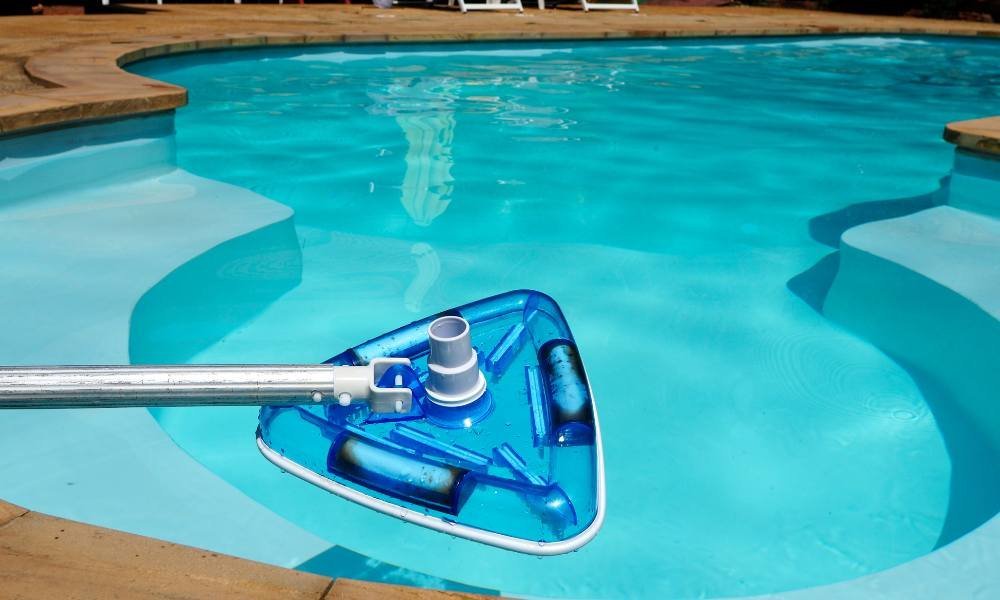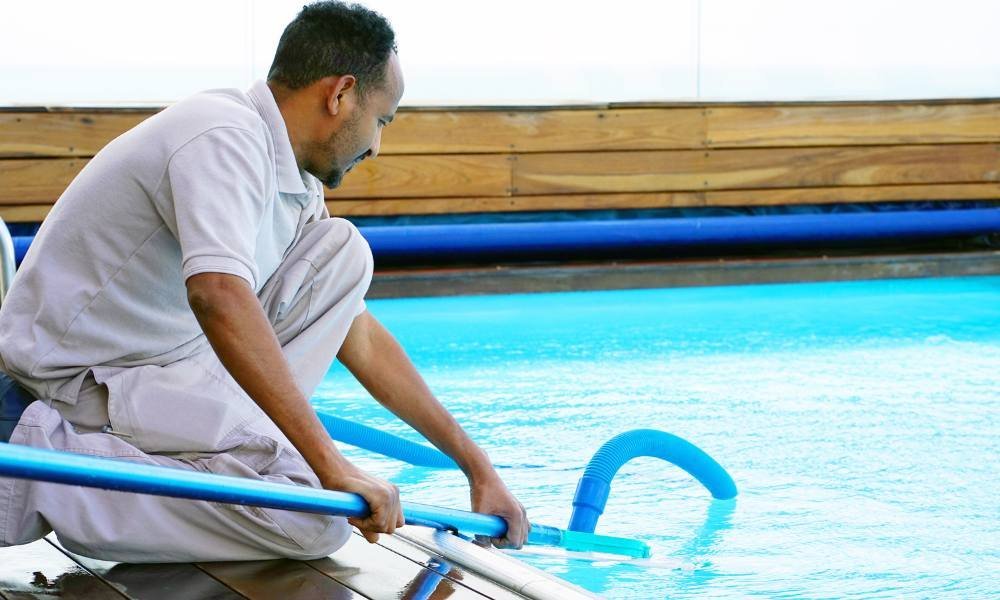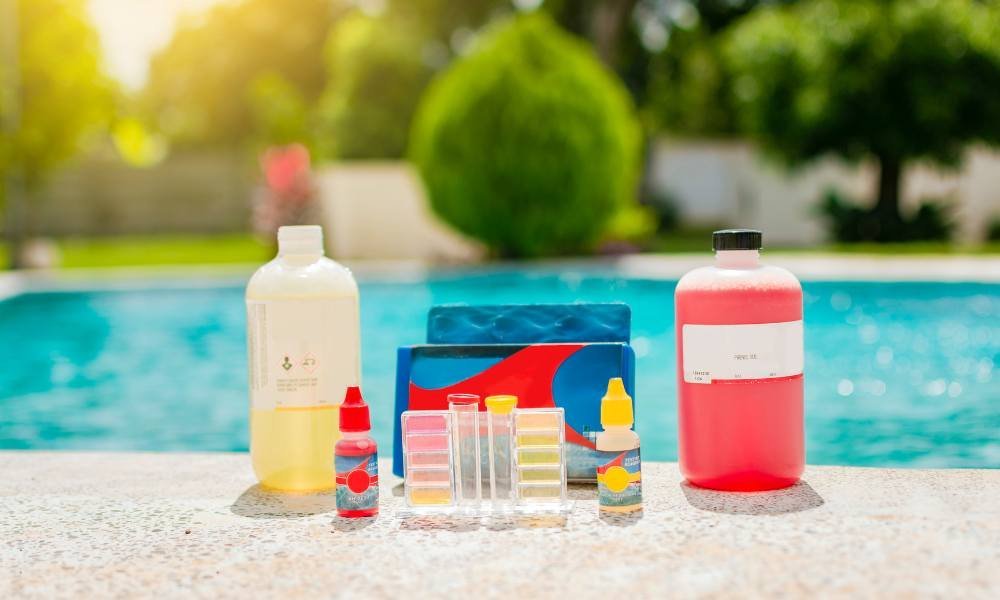Estimated reading time: 6 minutes
Owning a pool is a rewarding luxury, but maintaining it is a responsibility you can’t ignore. Whether it’s keeping the water sparkling or ensuring your equipment lasts, pool upkeep is essential. The big question is: should you handle it yourself or hire a professional?
In this guide, I’ll dive into the pros, cons, and cost considerations of DIY maintenance versus hiring experts. By the end, you’ll have the clarity to decide what works best for your pool and lifestyle.
What You’ll Learn:
- The advantages and challenges of DIY maintenance.
- The benefits and drawbacks of hiring professional services.
- Cost comparisons and scenarios best suited for each approach.
- Tips to combine DIY tasks with expert assistance for optimal results.
1. The Pros and Cons of DIY Pool Maintenance
Taking a hands-on approach to maintaining your pool has its perks, but it’s not without challenges.
Why DIY May Work for You:
- Save Money: Handling tasks like skimming and water testing yourself eliminates service fees.
- Flexibility: Clean and monitor your pool on your own schedule.
- Learn Your Pool’s Needs: DIY helps you understand your equipment and water chemistry better, giving you more control.
Challenges to Consider:
- Time-Consuming: Regular cleaning and testing require consistent effort, which can add up.
- Learning Curve: Mistakes in chemical balancing or equipment handling could lead to costly repairs.
- Physical Effort: Larger pools or those exposed to debris may require significant manual work.
Pro Tip: Start with simple tasks like skimming and brushing, and gradually build your expertise in water balancing and equipment checks.
2. Benefits of Professional Pool Services

If you’d rather spend your weekends swimming than cleaning, professional services could be the answer.
Advantages of Professional Care:
- Expertise and Efficiency: Trained technicians can handle complex tasks like equipment inspection and chemical balancing with precision.
- Time-Saving: Leave the heavy lifting to experts and enjoy a clean, ready-to-use pool.
- Preventative Maintenance: Professionals spot issues early, preventing major breakdowns.
Potential Downsides:
- Cost: Regular professional maintenance adds up, especially if you opt for weekly visits.
- Less Hands-On Control: You rely on someone else’s schedule and methods, which might not always align with your preferences.
Pro Tip: Choose reputable companies with certifications and strong reviews to ensure you’re getting quality service.
3. Comparing Costs: DIY vs. Professional Pool Maintenance
DIY Costs:
- Initial Investment: Tools like a skimmer, vacuum, and water testing kit can cost $200–$500.
- Ongoing Expenses: Chemicals and minor replacement parts average $50–$100 monthly.
Professional Services Costs:
- Single Visits: $75–$200 depending on pool size and condition.
- Monthly Contracts: $100–$400 for weekly cleanings.
- Special Services: Seasonal tasks like winterization or deep cleaning can cost $200–$500.
Long-Term Considerations:
- DIY mistakes, like improper chemical usage, can shorten equipment lifespan, leading to higher costs.
- Professional services may save money over time by preventing expensive repairs.
4. When DIY is the Right Choice
Ideal Scenarios for DIY:
- Small or Simple Pools: Less maintenance and fewer technical needs make DIY manageable.
- Light Usage: Pools that aren’t heavily used require minimal upkeep.
- Time Availability: If you can dedicate an hour or two weekly, DIY may suit you.
Essential DIY Tasks:
- Skimming: Remove debris daily or as needed to prevent clogging filters.
- Brushing and Vacuuming: Clean pool walls and floors weekly to prevent algae buildup.
- Water Testing and Balancing: Use a testing kit to monitor pH, chlorine, and alkalinity levels.
Pro Tip: Create a maintenance schedule to keep tasks organized and manageable.
5. When to Call the Professionals
Signs You Need Expert Help:
- Persistent Issues: Cloudy water, recurring algae, or imbalanced chemicals that don’t resolve with DIY methods.
- Complex Repairs: Problems with pumps, heaters, or filters are better left to trained technicians.
- Seasonal Tasks: Opening or closing your pool requires specific knowledge and tools to do correctly.
Specialized Services Professionals Provide:
- Deep cleaning, including pressure or acid washing.
- Diagnosing and repairing mechanical issues.
- Routine inspections to identify potential problems early.
Pro Tip: Even if you handle daily tasks, consider hiring a professional for seasonal maintenance to ensure your pool is in top shape.
6. Combining DIY and Professional Care
Why a Hybrid Approach Works:
Many pool owners find that blending DIY and professional services provides the best of both worlds.
How to Divide Tasks:
- DIY: Skimming, basic cleaning, and water testing.
- Professionals: Equipment inspections, chemical balancing, and deep cleaning.
Benefits of This Approach:
- Saves money by reducing reliance on professionals for routine tasks.
- Ensures complex or technical issues are handled by experts.
Pro Tip: Schedule a professional inspection once or twice a year to catch any hidden issues.
7. Making the Right Choice for Your Pool

Factors to Consider:
- Budget: Can you afford professional services, or are DIY options more practical?
- Time: Do you have enough free time to commit to regular maintenance?
- Knowledge and Confidence: Are you comfortable managing water chemistry and equipment?
- Pool Size and Complexity: Larger pools or those with advanced systems may require professional oversight.
Final Thoughts:
Whichever approach you choose, consistency is key. Neglecting maintenance leads to more significant issues and higher costs down the line.
FAQs
Q: How often should I clean my pool?
Skimming and testing water should be done weekly, while brushing and vacuuming can be done every 1–2 weeks.
Q: Can I switch between DIY and professional care?
Absolutely! Many pool owners start with DIY and bring in professionals for seasonal tasks or when issues arise.
Q: Are robotic pool cleaners worth it?
Yes, they can significantly reduce manual effort, making DIY maintenance more manageable.
Q: What’s the biggest mistake DIYers make?
Improper chemical balancing is a common issue that can damage equipment and affect water quality.
Conclusion
Whether you choose to go DIY or rely on professional help, the key to a pristine pool is regular, attentive care. DIY maintenance is budget-friendly and puts you in control, while professional services provide expertise and convenience.
Final Advice:
Start small with manageable DIY tasks, and don’t hesitate to call in the pros for complex issues or seasonal care. By combining both approaches, you can enjoy a clean, inviting pool without breaking the bank—or your back.



